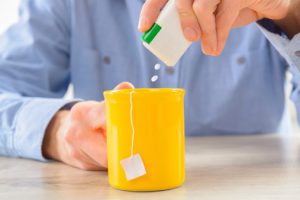Anyone who has ever tried to watch their weight, protect their teeth, or has been told that they have diabetes, has probably tried something made with an artificial sweetener. The concept of using sugar substitutes has been around for a very long time. A researcher at Johns Hopkins University accidently discovered a product that would be developed into what we now know as saccharin in 1879. The use of artificial sweeteners as part of our daily lives became more prevalent in the mid 20th century.
There are six sugar substitutes that have been approved by the U.S. Food and Drug Administration for use in foods and beverages. These are aspartame, sucralose, stevia, neotame, saccharin, and acesulfame potassium. These products are very sweet and therefore only very small quantities need to be added to food and beverages to make them taste good. For as long as these products made with artificial sweeteners have been available there has been controversy over any harmful side effects that they may pose. So far the FDA has not been able to substantiate any claims of harmful effects from their use.
As people in the United States have become more health conscious, the use of products made with artificial sweeteners has increased. More and more products are being produced each year that are labeled “Sugar Free”, “Diet”, “Low-Cal”, “Light”, or “Artificially Sweetened”. People are naturally attracted to foods that taste sweet. It has been stated that the taste of sugar may even be addictive. While limiting the intake of sugar may be seen as a good trend, people seem to be consuming more of the artificially sweetened products which may not be beneficial in the long term. Over indulgence in products that are made with these artificial sweeteners can still cause weight gain.
All content of this newsletter is intended for general information purposes only and is not intended or implied to be a substitute for professional medical advice, diagnosis or treatment. Please consult a medical professional before adopting any of the suggestions on this page. You must never disregard professional medical advice or delay seeking medical treatment based upon any content of this newsletter. PROMPTLY CONSULT YOUR PHYSICIAN OR CALL 911 IF YOU BELIEVE YOU HAVE A MEDICAL EMERGENCY.

